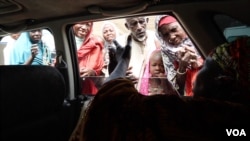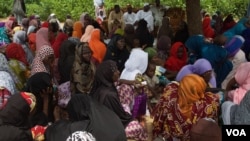Hajia Hawa is working to help Nigerians displaced by fighting with the Islamic militant group Boko Haram.
And she is doing it on her own terms.
On an average day, Hawa walks along a busy road in the northeastern Nigerian city of Maiduguri. She very quickly gets the attention of the people around her.
Sometimes it is old or disabled adults. Very often, hungry children in torn clothing run to her. Many of them have not eaten a meal for days. Every time, they hold out their hands to her, and she gives each person a small piece of paper.
The paper is a card that serves as a voucher. The cards can be exchanged for free food. Hawa walks around Maiduguri handing them out.
“This will allow you to come to my house in Moranti side to get food for up to six months,” Hawa tells them, describing the area in Maiduguri where she lives.
In a city where many people are experiencing hunger, Hawa usually creates a lot of good feelings.
God's work
Hawa is not a rich woman. She was born and raised in Maiduguri. She is well-respected among the poorest people in the community. She says she is only doing the work of God.
“I’m Hajia Hawa, I’m suffering for people that need help.”
More than one million people have moved to Maiduguri to escape violence from Boko Haram. The militant group has killed an estimated 20,000 people in its seven-year campaign against the Nigerian government. The conflict has forced around 2.3 million people from their home.
The fighting has created a humanitarian crisis. Boko Haram has destroyed farms and crops. Some farm families are too afraid to return to home. This has led to a shortage of food in some areas.
Hajia Hawa lost her husband in 2014. He went missing one day. She suspects that Boko Haram killed him.
Hawa does not get money from the government. She pays for her acts of kindness by selling off her father’s land. But these days, she is running out of land to sell. Hawa says she now is forced to go to rich people and ask them for money.
She uses the money to buy food, pass out clothing to those in need and print food vouchers.
“Hajia Hawa gave me a sewing machine, and she always gives me food to eat. Nobody else is helping us. Hajia Hawa is our father, mother, everything for us.”
Staying together
During the past five years, the number of people who depend on Hawa has grown. She currently has a list of nearly 6,000 people who depend on her.
“Even now, if I tell these people to leave me, they cannot leave me,” she says. “We have been together for a long time. We love each other. No matter how we suffer, we will still stay together.”
Once, police officers arrested Hawa. She says the officers questioned how she earned her money. She said the officers suspected the money came from Boko Haram. They suspected she was attempting to influence people so they will support Boko Haram.
The officers took her to the police station and kept her there for three days. However, thousands of her supporters went to the station to demand her release.
Hawa has become an important person in her community. She wakes up every morning to see more people stopping by her home, hoping to find some sort of assistance. They look to Hawa as their leader.
“They are all needy,” she says. “Some women here lost their husbands. Some are the children that lost their parents. We are here suffering. Some will beg, some will not beg, some will help me to work.”
Hawa lives in a small house where she sleeps with her daughters. There is another building with two bedrooms where some of the displaced people sleep. She is building more buildings where more displaced people can sleep.
Hawa often speaks to the displaced people under a tree on her property. She speaks to them about why they must stay together to help each other survive.
One old man once told Hawa, “We support you 100 percent. Powerful men have neglected us and you have come to our aid.”
I’m Phil Dierking.
Chika Oduah wrote this story for VOANews.com. Phil Dierking adapted his report for Learning English. George Grow was the editor.
What do you think of the giving assistance to displaced people? We want to hear from you. Write to us in the Comments section or on our Facebook page.
_____________________________________________________
Words in This Story
voucher – n. a document that gives you the right to get something, such as a product or service, without paying for it
sewing – n. the act or process of using a needle and thread to make or repair something, such as a piece of clothing
allow – v. to permit (something) : to regard or treat (something) as acceptable
beg – v. to ask people for money or food
neglect – v. to fail to take care of or to give attention to someone or something







